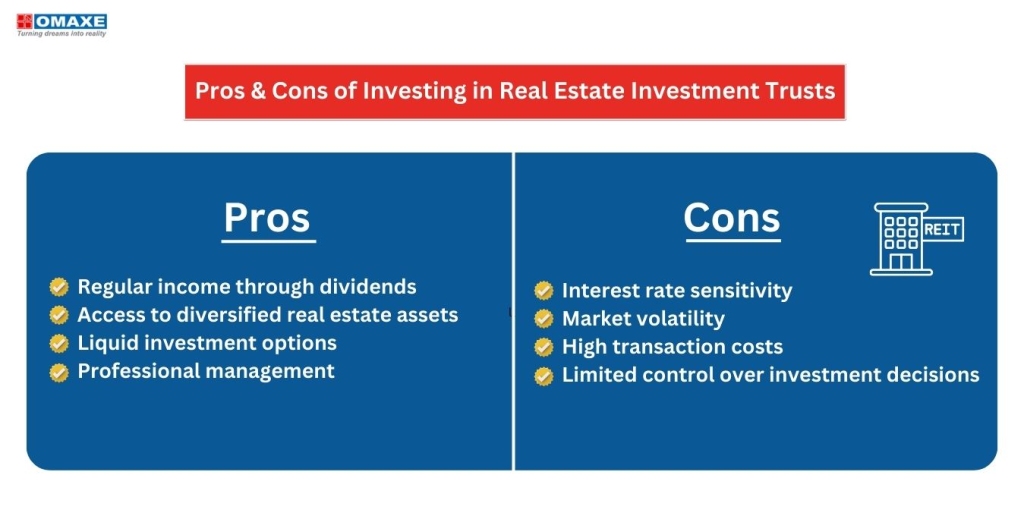REIT stands for “Real Estate Investment Trust“. A REIT is a company that makes direct investments in real estate by getting mortgages on houses or other real estate.
It might be a partnership, corporation, trust, or association. The main advantage of investing in REITs is that you can diversify your investment portfolio by gaining exposure to commercial real estate without having to deal with the hassles of owning and managing a variety of real estate assets. Additional benefits of investing in REITs include very low investment minimums and professional asset management.
Table of Content
1. What are Real Estate Investment Trusts (REITs)?
2. How Does a Company Qualify as a REIT?
3. Pros of Investing in Real Estate Investment Trusts (REITs)
4. Cons of Investing in Real Estate Investment Trusts (REITs)
5. Types of Real Estate Investment Trusts (REITs)
6. Factors to Consider Before Investing in REITs
8. Investing in REITs vs Private Equity Real Estate
9. Conclusion
10. FAQs
What are Real Estate Investment Trusts (REITs)?
A real estate investment trust (REIT) is a company that owns, controls, or finances real estate that generates income. Businesses that manage mortgages and portfolios of valuable real estate assets are known as real estate investment trust companies. The income from real estate investments is now available to individual investors without requiring them to own, manage, or finance any real estate themselves. In REITs, which are modeled after mutual funds, the capital of numerous investors is pooled.
Investors can own expensive real estate with the aid of REITs and gradually build up their wealth by receiving dividend income. By doing this, investors have the opportunity to grow their capital while also earning income.
How Does a Company Qualify as a REIT?
A REIT can be considered as a company that does its investment in real estate properties that are income generating. Then REIT pays the dividends to different shareholders.
To be a REIT These factors are required:
- Investment of around 75% asset value in rela estate sector.
- Derive the value of around 75% in different forms like, interest, rent or sales of the real estate.
- Payment of around 90% of dividends from taxable income.
- Board of trustees will manage it and must be holding around 100 shareholders.
Pros of Investing in Real Estate Investment Trusts (REITs)

In recent years, REIT stocks have become well-liked financial instruments. Due to the numerous advantages REITs offer investors, there are several good reasons to invest. The following are some major benefits of investing in REITs:
Regular income through dividends
When an investor wants to invest their money, they search for opportunities that will yield the highest possible returns. One of the financial strategies that yield excellent returns over the long run is REITs. It enables an investor to increase their wealth over time through consistent capital growth. One can get excellent returns on their investment and guarantee a consistent income stream by investing in REITs. 90% of REIT firms’ profits must be paid out as dividends to shareholders. Investors get these dividends yearly, giving them a reliable source of income.
Access to diversified real estate assets
For any investor, portfolio diversity is absolutely essential. And there aren’t many options for diversification that outperform real estate assets. Therefore, incorporating REIT stocks and mutual funds into one’s investment portfolio might be a wonderful method to diversify it away from other riskier investment options.
Liquid investment options
Real estate transactions could take some time. On the other hand, REITs make great liquid investments. With a click, you can buy or sell a REIT at any time. In the event that you require cash from your investment, you have immediate access to your money.
Professional management
The Securities and Exchange Board of India (SEBI) strictly regulates REITs, just like other equities and mutual funds. This guarantees that they will continue to be honest and accountable to their investors. A professional management team oversees the properties a REIT owns. Because of this, managing commercial real estate functions effectively without your involvement. If you need to know about the pros of real estate investment in India, then read out for more.
Cons of Investing in Real Estate Investment Trusts (REITs)
Interest rate sensitivity
The repo rate is periodically adjusted by the Reserve Bank of India (RBI), which also affects interest rates. Additionally, any changes in interest rates have a direct impact on the profits made by REITs. The value of REIT equities often drops as interest rates rise and vice versa. Most investments are influenced by a variety of factors, but in the case of REITs, interest rate changes can have a significant impact. Rising interest rates could have a negative impact on REIT prices.
Market volatility
A significant growth hurdle for REITs. Based on prevailing market and economic conditions, a REIT’s value will change. Some are governed by regulations, but others are influenced by the business climate. The price of REITs may fall as a result of a slump in the stock market.
High transaction costs
The purchase and sale of REITs can be costly. It can cost money to buy and sell shares, and you might have to pay taxes on your gains. -The revenue from REITs might fluctuate. Dividend payments might not always be made, as they are subject to change. -If you invest in REITs, you will have less control over your money.
Limited control over investment decisions
If you invest in REITs, you will have less control over your money. You cannot choose which properties the REIT invests in, and you cannot determine when to sell your shares.

Types of Real Estate Investment Trusts (REITs)
Equity REITs
One of the most common types of REIT is equity REITs. It usually focuses on managing and supervising commercial structures that generate income. Equity REITs are real estate firms that own or manage properties that generate income, such as office buildings, shopping malls, and apartment complexes, and then lease the space to tenants. Equity REITs distribute the majority of their annual profits as dividends to their shareholders after covering operational costs for their properties. Equity REITs profit from asset sales as well.
Investing in commercial properties through equity REITs can provide investors with a steady stream of rental income and the potential for property appreciation.
Mortgage REITs
Similar to purchasing any other publicly traded stock, an individual may purchase shares in an mREIT that is listed on significant stock exchanges. Shares can also be purchased via a mutual fund or exchange-traded fund (ETF). Mortgage REITs (mREITS), which buy or create mortgages and mortgage-backed securities (MBS), provide funding for real estate that generates income by collecting interest from these assets.
Hybrid REITs
A hybrid REIT incorporates both stock and mortgage investments. A hybrid REIT will own a variety of real estate assets, including office buildings and apartment complexes, as well as lend money to finance new or acquire existing mortgages.
For investors unsure of which REIT to pick, this can be a reasonable middle-ground alternative. Investors can further reduce risk regardless of market trends by combining both types of investments within the hybrid REIT.
Factors to Consider Before Investing in REITs
Risk tolerance
Your capacity for enduring uncertainty and investment losses is referred to as your risk tolerance. Your capacity for risk is based on your particular financial situation. Your portfolio’s investment mix should be directly influenced by your risk tolerance.
Investment goals
Select REITs that are consistent with your investing goals, such as dividend income or long-term growth.
Asset allocation
It is essential to evaluate your portfolio before making new asset allocations. For instance, if real estate makes up a sizable portion of your portfolio, you must diversify your holdings by increasing investments in safe instruments like debt and cash while decreasing your allocation to risky assets like real estate or equities.
Valuation metrics
A real estate valuation is important for the listing price, investment research, insurance, and taxation—all of which depend on it—as well as for financing the acquisition.
Also Read: Commercial Real Estate vs Stock Market
How to Invest in REITs
Direct investment in publicly traded REITs
You purchase a specific property when you invest directly in real estate. Rental revenue, property appreciation, and earnings from any businesses that depend on real estate are based on how direct real estate investors profit from their investments.
Indirect investment through mutual funds or exchange-traded funds (ETFs)
A mutual fund’s operation is quite similar to that of an exchange-traded fund (ETF), a type of pooled investment security. ETFs frequently track a specific industry, index, commodity, or other asset, but unlike mutual funds, they can be purchased or sold on a stock exchange just like regular equities. Instead of purchasing the equities separately, ETFs have lower broker commissions and expense ratios.
Private REITs
Real estate investment trusts, known as private REITs, are not required to register with the SEC and do not trade on major stock exchanges. They acquire real estate, lease it, collect rent, and provide dividends to stockholders. Typically, they are only offered for sale through brokers or specialized dealers to accredited or institutional investors. They might have larger dividend yields than publicly traded REITs, but they also lack transparency and are less liquid.

Investing in REITs vs Private Equity Real Estate
These differ from each other in 4 ways:
- REITs are liquid and Publicly traded whereas private equity is exclusive and illuquidated.
- REITS have to pay through dividends and help with tax savings whereas Private equity suffers from tax complexities and pays through distributions.
- REITs investment is done in stable real estate whereas the private equity investment seeks value add or opportunistic properties.
- REITs have a significantly lower amount of fees structure whereas equity has a significantly higher amount of minimums and fees.
Conclusion
Real investments with a total return are REITs. Get in touch with the best Real estate company in India Omaxe, to start investing today!! They offer both substantial long-term capital gains and large dividend yields. Look for companies that have successfully provided both services in the past. Investment in REITs is a great alternative to traditional equities and bonds for portfolio diversification because of their high dividend yields and long-term capital appreciation.
Buying a stake in a publicly traded real estate investment trust can make a lot of sense for investors who want to increase their exposure to real estate. Just bear in mind that, given that share prices themselves might not fluctuate significantly over the long term, they might be more suited for dividend investing as opposed to growth investing.
For long-term investors looking for respectable returns, REITs are typically a solid choice. Before spending their hard-earned money, however, one needs to do research on the Real estate companies in India.
So, if you’re looking to “Invest Real Estate in India,” take the time to research and understand the market dynamics, legalities, and emerging opportunities to ensure a successful investment journey.
FAQs
Q1. Are REITs Risky Investments?
REITs are in general equities that get invested in the real estate sector and provide high amounting dividends to investors. REITs are sourced on various risk factors like market fluctuations, interest rates, leverage, liquidity and leverage. REITs are not recommended for risk averse investors or for capital appreciations.
Q2. Is investing in REITs a good idea?
Investment in REITs can be a great idea if you want income levels and better diversity from the real estate sector. Still, REITs suffer from market fluctuation like market volatility, interest rates, taxation, leverage and liquidity. REITs are not recommended for risk averse investors or for capital appreciations.
Q3. What is the minimum amount for REIT in India?
The minimum amount that you can invest in REITs are from INR 10,000 to INR 15, 000 according to the SEBI regulations. The Minimum lot size of REITs will be considered as 1 unit.



6 Comments
Comments are closed.